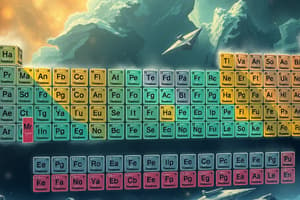Podcast
Questions and Answers
How did Mendeleev organize the rows in the periodic table?
How did Mendeleev organize the rows in the periodic table?
In rows in order of increasing mass.
Why were there some gaps in Mendeleev's table?
Why were there some gaps in Mendeleev's table?
Some elements had not yet been discovered.
What element supported Mendeleev's missing elements?
What element supported Mendeleev's missing elements?
Gallium
How are elements arranged in the modern-day periodic table?
How are elements arranged in the modern-day periodic table?
What is a period?
What is a period?
What is a group?
What is a group?
When do properties of elements repeat in predictable ways?
When do properties of elements repeat in predictable ways?
What is periodic law?
What is periodic law?
What does the atomic mass value depend on?
What does the atomic mass value depend on?
What is an atomic mass unit (amu)?
What is an atomic mass unit (amu)?
What are elements classified as?
What are elements classified as?
What is a metal?
What is a metal?
What is a transition metal?
What is a transition metal?
What is a nonmetal?
What is a nonmetal?
What is a metalloid?
What is a metalloid?
What is a valence electron?
What is a valence electron?
Why do elements of a group have similar properties?
Why do elements of a group have similar properties?
Which group can be cut easily with a knife?
Which group can be cut easily with a knife?
Which group is shown with the ways they react to water?
Which group is shown with the ways they react to water?
Which group is the boron family, containing aluminum?
Which group is the boron family, containing aluminum?
Which group is the carbon family?
Which group is the carbon family?
What are two elements in fertilizer?
What are two elements in fertilizer?
In which group are nitrogen and phosphorus found?
In which group are nitrogen and phosphorus found?
What is the oxygen family?
What is the oxygen family?
What is group 7A?
What is group 7A?
What is group 8A?
What is group 8A?
Why are noble gases difficult to find?
Why are noble gases difficult to find?
List three ways elements in a periodic table can be classified.
List three ways elements in a periodic table can be classified.
What is the name of an element that has 1 isotope at 10 amu and the other at 11 amu?
What is the name of an element that has 1 isotope at 10 amu and the other at 11 amu?
Flashcards are hidden until you start studying
Study Notes
Mendeleev's Organization of the Periodic Table
- Mendeleev organized rows in the periodic table by increasing atomic mass.
- Gaps existed in Mendeleev's table due to undiscovered elements.
- Gallium was one element that supported the existence of Mendeleev's predicted missing elements.
Modern Periodic Table Arrangement
- The modern periodic table arranges elements by increasing atomic number.
- A period refers to each row of elements in the table.
- A group refers to each column of the periodic table.
Properties and Patterns
- Properties of elements exhibit predictable repetition based on atomic numbers.
- Periodic law describes the pattern of repeating properties across the periodic table.
Atomic Mass and Isotopes
- Atomic mass depends on the distribution and nature of an element's isotopes.
- Atomic mass unit (amu) is defined as one twelfth the mass of a carbon-12 atom.
Classification of Elements
- Elements are classified as metals, nonmetals, and metalloids.
- Metals are good conductors of heat and electric current.
- Transition metals form a bridge between groups of the periodic table.
- Nonmetals are poor conductors of heat and electricity.
- Metalloids have properties that are intermediate between metals and nonmetals.
Valence Electrons and Group Properties
- Valence electrons are the highest occupancy electrons in an atom.
- Elements within a group share similar properties because they have the same number of valence electrons.
Specific Groups and Their Characteristics
- Group 1a elements can be easily cut with a knife.
- Group 2a elements are notable for their reactions to water.
- Group 3a, known as the boron family, includes aluminum.
- Group 4a is referred to as the carbon family.
- Nitrogen and phosphorus, found in fertilizers, belong to Group 5a.
- Group 6a is known as the oxygen family.
- Group 7a consists of the halogens.
- Group 8a is identified as the noble gases, which are odorless, colorless, and extremely unreactive.
Additional Classifications
- Elements can be classified based on their state of matter, metal/nonmetal/metalloid status, and whether they naturally occur.
Noteworthy Isotopes
- Boron has one isotope at 10 amu and another at 11 amu.
Studying That Suits You
Use AI to generate personalized quizzes and flashcards to suit your learning preferences.




